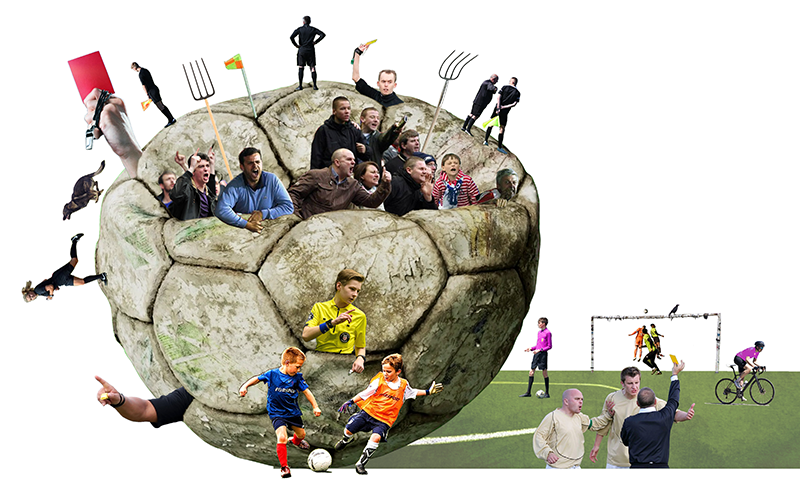
Increasingly facing threats and intimidation, many officials have simply decided to walk away from the game
December 23 ~ In the past five years, the UK has lost almost one in seven of its HGV drivers. While this supply of labour has dropped, the demand for the haulage hasn’t, causing queues at pumps, fuel shortages, problems with imports and deliveries, among all the other issues that we have seen over recent months.
In a similar vein, it is estimated that registrations of referees in England dropped by between 20 and 30 per cent in 2021. While this supply of labour has reduced, the demand for referees hasn’t. This has already led to thousands of matches so far this season either being postponed or going ahead without a qualified match official in charge, with volunteers or substitutes taking the whistle instead.
This shortage is seemingly causing widespread panic up and down the country. I have been a referee for 15 years, taking charge of junior and adult leagues and semi-professional games in the north-west. Every week, my phone is inundated with texts from managers pleading for me to run their game at the weekend. I’ve been left voicemails from coaches begging me to help them out. League secretaries send multiple emails a week requesting assistance with games. This is not just at grassroots level and on parks pitches either. Semi-professional leagues are struggling to fill appointment schedules and often needing to rely on teenage referees, sometimes with fewer than ten games’ experience, to run the line in non-League games with paid players and paying fans.
The pandemic is not the cause of these issues, but is no doubt a catalyst. The FA themselves say that around 7,000 referees leave the game each year, but they have not been able train their replacements over the past 18 months. Many referees chose not to return after football restarted following the lifting of restrictions, realising that walking the dog, seeing the grandkids, pottering around the garden or continuing with their lockdown hobby are more satisfying ways to spend a weekend. While I have continued to referee, I certainly do fewer games than before. Whereas I would previously say I’d be late to a Saturday evening out with friends and join them after my game, I am simply having a day off refereeing and prioritising what little I have of a social life. From officiating an average of ten games a month, I now do half that.
For the overwhelming majority, the main factor in their decision to no longer referee is the abuse and aggressive behaviour directed at them in almost every game. Every week, I see stories (and, increasingly more commonly, videos) of referees being shouted at, sworn at directly, accused of cheating, threatened and intimidated. Again, this is not even solely at grassroots level. In September, a clip was widely circulated of a manager being forcibly restrained by his own players to prevent him potentially attacking a trio of officials after an FA Trophy game. Another member of the club later pushed the referee. Why, having seen such incidents, would someone consider training to be a referee?
From the Premier League to mini-soccer, referees are held to a level of accountability and standards nobody else in the game is. Any hint of an error is an invitation for a dozen people to inform you of their disagreement, often loudly and aggressively, while a wild shot by a centre-back is laughed off. A misplaced pass might raise voices between team-mates, but is quickly forgotten. A manager making a poor substitution may not even be noticed. But referees are expected to be perfect, no matter what the level.
A manager of an under-15s team recently told me of the referee at his game having to warn the parents for the abuse he was receiving. On the team WhatsApp group the parents then began sharing comments about the referee’s decisions as well as personal insults, most of which contained a variation on several four-letter expletives. Only after the game did the parents find out that the referee was a Championship official helping out a local team while he recovered from injury. If a full-time, professional referee from the second tier of English football is subjected to such treatment in a junior game, what hope is there for a young boy or girl starting out?
While county FAs have a responsibility to act when informed of issues, the changes have to start at the roots, through action by clubs themselves. Managers, secretaries and club officials must challenge poor behaviour by their players, parents and fans. Players should be explicitly taught to respect the referee, just as they are trained to take a throw-in or learn a new set-play routine. Clubs should put in place temporary bans on parents at games if they constantly abuse the referee. Officials should be removed from their positions if they continually display poor temperament and set bad examples to others.
League officials can also play their part, by attending games where there have been reports of incidents in the past and being seen to support the referees in their actions. Many already do this effectively, by taking advantage of the current shortage and ensuring poorly behaved teams are at the bottom of the list when it comes to appointing available referees.
Referees themselves also have a responsibility to act accordingly, using the tools at their disposal. Sin-bins at grassroots have been a success, with dissent cautions down 38 per cent since the temporary dismissals were introduced in 2017. They should use warnings, cautions and dismissals with players when appropriate, be firm but fair with managers in what they expect of them, and ensure abuse from the sidelines is reported to leagues and FAs.
However, in many cases I don’t blame referees for not dealing adequately with the treatment they receive. Tackling abuse often leads the referee to be abused further, so they often turn a blind eye (or ear), keep their head down and hope to simply survive the game. But you can only do that so many times before calling it a day and hanging up the whistle along with thousands of others.
The disparity between the supply and demand of referees will at some point lead to changes in behaviour. It may well be that clubs and players are content with no longer having to pay for a referee and decide they can manage by providing their own. Or, more likely, they realise that football is better with a qualified official in charge and this will lead to attitudes towards the role improving, as people appreciate the benefit of an independent referee.
And that referee will still make mistakes. They will miss offsides. They will get penalties wrong. But it is never deliberate, as no referee enjoys getting a decision incorrect. We are there for the love of the game and because we enjoy being part of football. We take pride in knowing we are contributing towards a fair game and deserve respect for placing ourselves front and centre, where there is no hiding place. So look after your referees – we are in short supply. Jacob Tate
Illustration by Matt Littler
This article first appeared in WSC 416, January 2022. Subscribers get free access to the complete WSC digital archive – you can find out more here.
Want to see your writing published in WSC? Take a look at our pitching guide and get in touch
